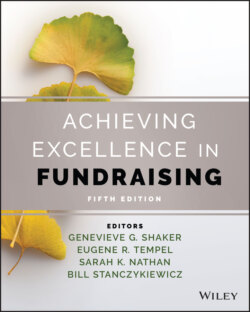Читать книгу Achieving Excellence in Fundraising - Группа авторов - Страница 47
Ethical Behavior
ОглавлениеIn Obedience to the Unenforceable, a report on ethical practice for nonprofit and philanthropic organizations, Independent Sector (IS) (2002) clarifies three types of ethical behavior that guide nonprofits: complying with applicable laws; doing the right thing, even in the face of hardship or discomfort; and choosing the ethical path between competing goods or conflicting values. The last, called ethical dilemmas, are the most difficult situations to address, often pitting core values against one another, so there is no easy right answer. There are commonly four types of “right versus right” ethical paradigms: truth versus loyalty, individual versus community, short‐term versus long‐term, and justice versus mercy (Kidder 1995, 17–18).
IS offers guidance to nonprofits in maintaining an ethical culture by adopting these shared values:
Commitment beyond self, service to the public at the core of civil society.
Obedience of the laws, a fundamental responsibility of stewardship, including those governing tax‐exempt philanthropic and voluntary organizations.
Commitment beyond the law, or “obedience to the unenforceable,” the higher calling of personal responsibility to society accepted by nonprofit professionals. This phrase is taken from a speech given by British barrister and judge Lord John Fletcher Moulton (1844–1921).
Commitment to the public good, requiring “those who presume to serve the public good … [to] assume a public trust” (Independent Sector 2002, 7).
Respect for the worth and dignity of individuals, a promise that all voluntary sector staff and volunteers must fulfill.
Tolerance, diversity, and social justice, reflecting civil society's rich heritage and the fundamental protections afforded to individuals in a democracy.
Accountability to the public, a central responsibility of public benefit organizations.
Openness and honesty, essential qualities of organizations that seek and utilize public or private funds to serve public purposes.
Responsible stewardship of resources, a duty of care governance requirement that nonprofit organizations vow to uphold (Independent Sector 2002).
IS encourages nonprofit leaders, especially fundraisers, to integrate these commitments into their work. To strengthen transparency, governance, and ethical standards, IS (2015) developed Principles for Good Governance and Ethical Practice, a resource for organizations to establish or improve policies and procedures.
Attitude and language matter. Fundraisers are not salespeople and donors are not targets. The dignified process of inviting someone to give is not hitting them up. Philanthropy is a voluntary act, so guilt and undue pressure have no place in communications between fundraisers and donors (MacQuillan 2016). And organizations and beneficiaries are not beggars, but active agents in addressing community needs.
Conducting oneself with integrity, demonstrating moral character, and exercising good judgment can help to avoid ethical issues common in nonprofits (Burchill 2006; Rhode and Packel 2009; Rosen 2019). These include:
1 Conflicts of interest, when trustees, executives, or fundraisers benefit materially from insider relationships to their organizations, such as contracting services from a board member's business, or when fundraisers compromise professional relationships by accepting personal gifts from donors. Because engendering trust is crucial, nonprofits and fundraisers should avoid even the appearance of conflicts of interest.
2 Accountability and reporting, when solicitation materials or reports are inaccurate in describing the purpose of fundraising efforts and the use of funds. Transparency and candor are expected traits of nonprofits, without which trust declines.
3 Tainted money, when conflicts arise between an organization's mission and values, or social mores in general, and the source of donated monies. For example, a number of universities and museums were forced to reckon with gifts from the Sackler family, owner of pharmaceutical company Purdue Pharma, which helped to fuel the opioid addiction crisis (Cascone 2020a).
4 Donor privacy, when the confidentiality of donor information is violated, shared with those who have no need to know, or when fundraisers or consultants take donor information with them from one job to the next. Donor privacy is sacrosanct, protected by the AFP code of ethics, and donor relationships belong to the nonprofit, not the fundraiser.
5 Compensation, when excessive salaries and benefits awarded to senior staff or perks to trustees and high‐level volunteers fall outside of what is acceptable to the IRS or breach a nonprofit's duty of care responsibility for prudent management of assets; or when fundraisers are paid a commission on monies raised, which contravenes AFP standards.
6 Financial integrity, when restricted funds are not applied as directed by patrons or are accepted with compromising strings attached; or when holdings in investment portfolios are at odds with institutional missions or values.
